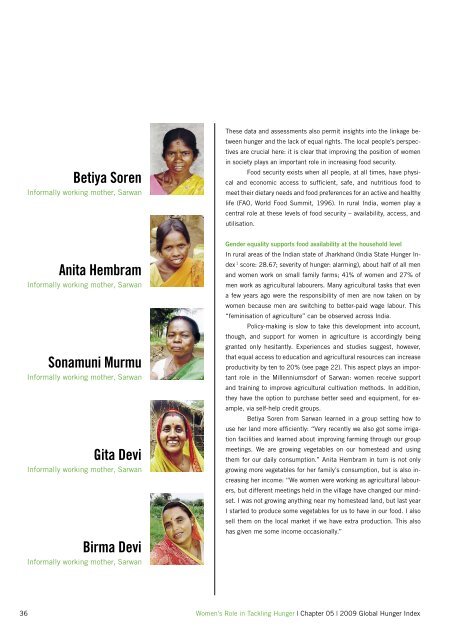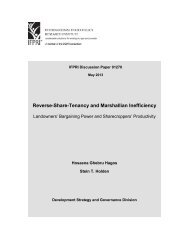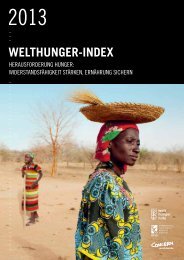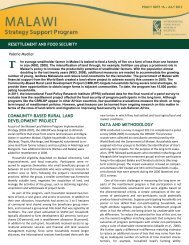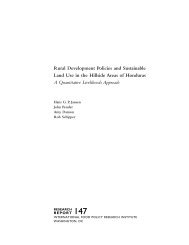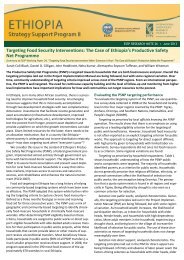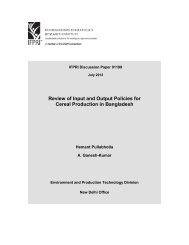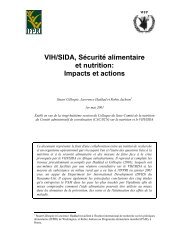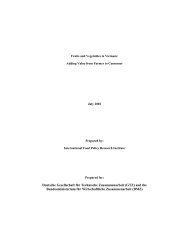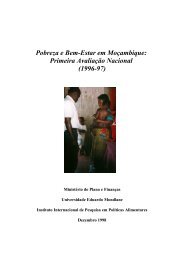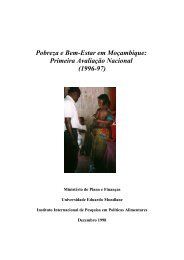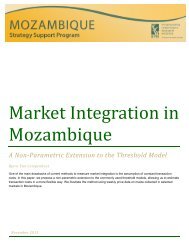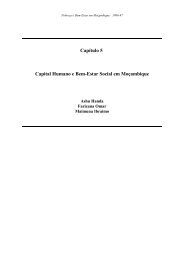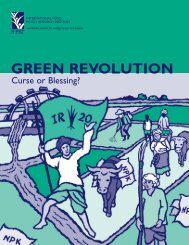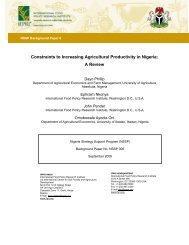2009 Global Hunger Index - International Food Policy Research ...
2009 Global Hunger Index - International Food Policy Research ...
2009 Global Hunger Index - International Food Policy Research ...
Create successful ePaper yourself
Turn your PDF publications into a flip-book with our unique Google optimized e-Paper software.
Betiya Soren<br />
Informally working mother, Sarwan<br />
Anita Hembram<br />
Informally working mother, Sarwan<br />
Sonamuni Murmu<br />
Informally working mother, Sarwan<br />
Gita Devi<br />
Informally working mother, Sarwan<br />
Birma Devi<br />
Informally working mother, Sarwan<br />
These data and assessments also permit insights into the linkage be-<br />
tween hunger and the lack of equal rights. The local people’s perspec-<br />
tives are crucial here: it is clear that improving the position of women<br />
in society plays an important role in increasing food security.<br />
<strong>Food</strong> security exists when all people, at all times, have physical<br />
and economic access to sufficient, safe, and nutritious food to<br />
meet their dietary needs and food preferences for an active and healthy<br />
life (FAO, World <strong>Food</strong> Summit, 1996). In rural India, women play a<br />
central role at these levels of food security – availability, access, and<br />
utilisation.<br />
Gender equality supports food availability at the household level<br />
In rural areas of the Indian state of Jharkhand (India State <strong>Hunger</strong> <strong>Index</strong><br />
1 score: 28.67; severity of hunger: alarming), about half of all men<br />
and women work on small family farms; 41% of women and 27% of<br />
men work as agricultural labourers. Many agricultural tasks that even<br />
a few years ago were the responsibility of men are now taken on by<br />
women because men are switching to better-paid wage labour. This<br />
“feminisation of agriculture” can be observed across India.<br />
<strong>Policy</strong>-making is slow to take this development into account,<br />
though, and support for women in agriculture is accordingly being<br />
granted only hesitantly. Experiences and studies suggest, however,<br />
that equal access to education and agricultural resources can increase<br />
productivity by ten to 20% (see page 22). This aspect plays an important<br />
role in the Millenniumsdorf of Sarwan: women receive support<br />
and training to improve agricultural cultivation methods. In addition,<br />
they have the option to purchase better seed and equipment, for example,<br />
via self-help credit groups.<br />
Betiya Soren from Sarwan learned in a group setting how to<br />
use her land more efficiently: “Very recently we also got some irrigation<br />
facilities and learned about improving farming through our group<br />
meetings. We are growing vegetables on our homestead and using<br />
them for our daily consumption.” Anita Hembram in turn is not only<br />
growing more vegetables for her family’s consumption, but is also increasing<br />
her income: “We women were working as agricultural labourers,<br />
but different meetings held in the village have changed our mindset.<br />
I was not growing anything near my homestead land, but last year<br />
I started to produce some vegetables for us to have in our food. I also<br />
sell them on the local market if we have extra production. This also<br />
has given me some income occasionally.”<br />
36 Women’s Role in Tackling <strong>Hunger</strong> | Chapter 05 | <strong>2009</strong> <strong>Global</strong> <strong>Hunger</strong> <strong>Index</strong>


